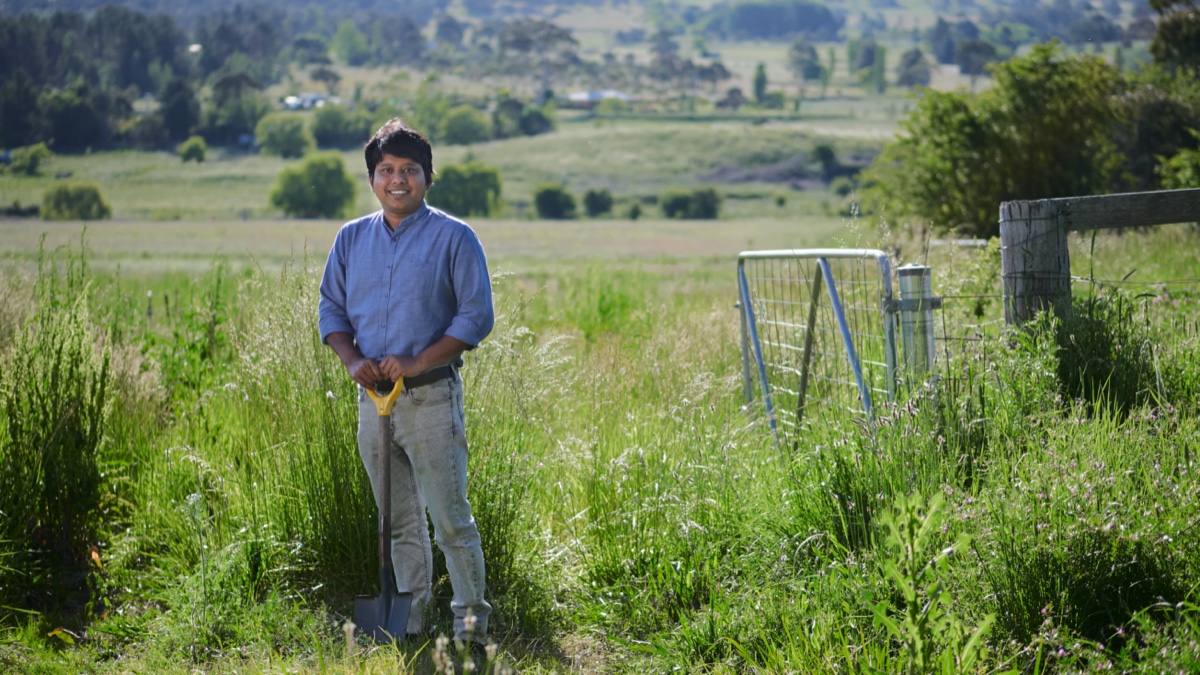Despite 20 years of discussion, management of soil carbon on farms as part of Australia's response to climate change is still in its infancy. After driving 7000 kilometres to talk with farmers, Nurul Amin feels he starting to understand why.
Mr Amin, a University of New England (UNE) PhD student, found that government soil carbon policy is too simplistic in its aims and too complex in execution to persuade farmers to work on soil carbon sequestration driven by a carbon price.
In response, he has developed a "social-ecological framework" that he believes can guide soil carbon policy development by engaging farmers in the policy-creation process.
While relatively few farmers are interested in the Federal Emissions Reduction Fund, there are a significant number of farmers interested in sequestering soil carbon, Mr Amin said.
"A lot of farmers are independently managing their soil carbon in the belief that they are benefiting through improved ecological health and farm productivity. But government soil carbon policy is not persuading these farmers to commit to building carbon under a government scheme."
Why is government policy failing to engage the people it needs to engage?
Mr Amin believes that policy fails to consider the social aspects of farmers and farming, and how these human aspects interact with the ecological components of soil carbon sequestration.
Most information seeking to engage farmers with soil carbon sequestration focuses on the ecological aspects of the issue, while ignoring the social-ecological aspects. Mr Amin believes farmers currently uninterested in soil carbon would be more inclined to invest in carbon-building practices if they better understood the "co-benefits" of the practices, like potentially improved productivity and resilience to extreme events.
As a step toward resolving the problem, he has started developing a framework for policy development that integrates social influences (why farmers do what they do) with the ecological imperatives for building soil carbon.
"We need to better cross-reference the social indicators that encourage people to improve their soil carbon practices with the ecological indicators," Mr Amin said.
His draft framework proposes a "participatory model" of policy development in which farmers themselves play a central role. Rather than being handed policy which farmers must adapt to, Mr Amin's framework suggests that farmers play a central role in a policy development process that is constantly adapting to feedback from the ground.
"This framework may help to assess the interdependencies of the social and ecological components of soil carbon management, and hence ensure the sustainability a soil carbon policy, which in turn might help Australia achieve its sustainable development goals toward offsetting carbon emissions."
Mr Amin is in the final stages of writing his PhD thesis on his work, a major milestone for the Bangladesh-born researcher.
As an Associate Professor in the Department of Environmental Science at Patuakhali Science and Technology University, Bangladesh, Mr Amin was looking for a new angle on land management toward sustainable development goals.
"I wanted to work on developing a process that would be low-cost, but which could be applied with immediate practical effect," he said.
A Skype discussion with Associate Professor Lisa Lobry de Bruyn of UNE's School of Environmental and Rural Science persuaded him that a UNE PhD in soil carbon management met his goals.
All doctorates are complicated, but Mr Amin's has been more complicated than most. Acute drought meant that for much of his research, his study zone was losing historical volumes of soil carbon, rather than gaining it. The farmers he was working with lost interest in soil carbon because of the overwhelming pressures to survive the extreme circumstances that had hit them.
The arrival of COVID-19 also halted Mr Amin's long-anticipated plans for his wife and daughter to join him in Armidale. His daughter, who is now three, and has spent half her young life without seeing her father.
UNE's support has been one bright spot in the homesickness and depression that has hit Mr Amin through the seven attempts he has made to be reunited with his family. He was awarded an extension on his UNE International Postgraduate Research Award and supported by the School of Environmental and Rural Science research fund, which has made scarce funds stretch the extra distance required to complete his thesis in exceptional circumstances.
Still, Mr Amin hopes that his wife and daughter will soon be be with him as he continues to refine his social-ecological framework and help Australia develop world-class soil carbon policy.


